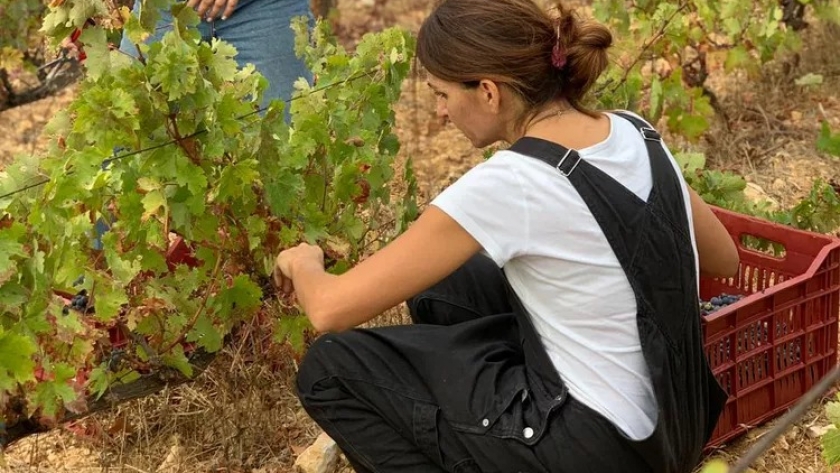
Neighbors in northern Lebanon’s Bekaa Valley, Chami and Lteif spent years helping Chami’s husband, Eddie Chami of Mersel Wine, during harvest and other winemaking efforts. The duo credit him for pushing them to pursue their own wine label, which has one clear goal: to pay female workers the same as their male counterparts.
“Harvest starts around 4:30 a.m., [so] these women wake up extra early,” says Chami. “They do the washing, make breakfast for the kids, they work in the field in the sun…it’s very tiresome. Then they come home and there’s more work, there’s no rest. Men can rest. Women work three times as hard and deserve recognition.”
:max_bytes(150000):strip_icc():format(webp)/Ladies-of-Lebanon-FT-BLOG0824-Heya-Wines-11-8c15452ce2f44ef2bb1d4c6c3e472211.jpg)
Chama and Lteif started experimenting with small-batch wine in 2019. By 2022, they produced their first vintage under Heya Wines (heya means “she” in Arabic).
Every step of the production — from harvest to pruning, pressing, packaging, and delivery — is done by women from the local area. The labels on each bottle feature the 15–20 women who work harvest and, most importantly, are paid an equal wage.
Heya also shares winemaking facilities with Laila Maghathe, the Cincinnati-born half-Palestinian winemaker behind Love Letter, a label established in 2021.
:max_bytes(150000):strip_icc():format(webp)/Ladies-of-Lebanon-FT-BLOG0824-Heya-Wines-05-9a3eafc09c444b7989c02ae85d0be2d0.jpg)
Maghathe’s Love Letter is, in her words, “an ode to making wine in a place that feels like home.” Her portfolio includes a varietal Merlot, as well as wines made with indigenous varieties like Merwah, a white grape related to Sémillon that yields wines with citrus, floral, and nutty notes. Another native variety, Marini (also called Sabbaghieh) presents dark-skinned teinturier grapes, meaning both the fruit’s skin and flesh are red, and yields highly pigmented wines with notes of red fruits and spices. Maghathe says that although the region is ideal for winemaking, the annual travel between growing seasons between Cincinnati to Lebanon is no cake walk, especially given political tumult.
“Of course, [war] affects you mentally and subconsciously,” says Maghathe. “Knowing there is this tension before I fly. ‘Will I be able to go? Will the borders be shut off? Will there be a war starting tomorrow?’ But then, you just have to get up and do it. You can’t let the fear stop you.”
During a tumultuous period from 2019–20 that saw a countrywide financial collapse, global pandemic, and a port explosion in the capital city of Beirut, Lebanon has seen its fair share of hardship in recent years. Now, as the neighboring Israeli-Palestinian war seeps into the southern border of Lebanon, the region remains far from healed.
“Making wine in those circumstances means that the people here will persevere through anything,” says Maghathe. “You have to continue your everyday life.”
:max_bytes(150000):strip_icc():format(webp)/Ladies-of-Lebanon-FT-BLOG0824-Heya-Wines-06-55a0bb4fec0148f3a68ba1058d64d1eb.jpg)
But for these women, everyday life means making wine. For Heya, that includes still and sparkling wines produced from local Merwah grapes, whole cluster Grenache and Syrah that employed carbonic maceration, and a crushable coferment of Merwah grapes and apples.
“The apples and grapes grow intertwined,” says Chami. “A lot of farmers couldn’t pay to refrigerate the apples. We decided [it was] better for us not to waste them because refrigeration is expensive. So, we took them and put them with Merwah.”
After a seven-day maceration on the skins of Merwah, the juice is pressed into stainless steel tanks. Apples are added whole and begin a carbonic maceration for about eight weeks. The juice is then drained before the apples are pressed, and both grape and apple juices are combined and then fermented until the wine is dry. A sparkling version of the wine is made by adding apple juice to the finished dry wine and allowing a second fermentation in the bottle with no added yeast or disgorging.
“In nature, there is a marriage between apples and Merwah,” says Lteif. “We didn’t want to separate them.”
:max_bytes(150000):strip_icc():format(webp)/Ladies-of-Lebanon-FT-BLOG0824-Heya-Wines-09-b272987f7df44306b2ca54e5df61616d.jpg)
Lebanese women gained the right to vote and participate in elections in 1952. (By comparison, women in the U.S. won the same privileges in 1920.)
Today, Lebanon is seeing one of its strongest feminist movements, with more women taking to the workforce. As of 2023, the labor force includes 27.5% female labor participants to 65.5% male labor participants, according to the World Bank Group gender data. In the world of wine, however, women winemakers account for far less.
Pianist and musicologist Roula Abou-Khater of Coteaux du Liban is regarded by many as the first commercial woman winemaker in Lebanon, only as of 2009 when she began to manage the estate after her husband passed away. Tamara Gebara, Khater’s daughter-in-law, is now Coteaux du Liban’s winemaker, with a focus on French varieties including Cinsault, Viognier, Syrah, and some local grapes like Obaideh (also spelled Obeidi.)
:max_bytes(150000):strip_icc():format(webp)/Ladies-of-Lebanon-FT-BLOG0824-Laila-Maghathe-Love-Letter-02-371d6473db264147b099b00446bb7ad3.jpg)
Hiba Salloum founded Umami Wines in 2016. The women-led winery makes Tempranillo rosé, an Obaideh white, and a Cabernet Franc and Merlot red blend. In 2019, just a decade after the first woman-led winery was established, Heya Wines was formed. Though these producers make small-batch wines, Heya Wines, Love Letter, and Coteaux du Liban are all available in the U.S. at select shops and restaurants.
“In the Middle East, it’s a male-dominated workforce. We wanted to support women, especially in winemaking,” says Chami. “We wanted to show everyone we can do this, too."
Food & Wine
